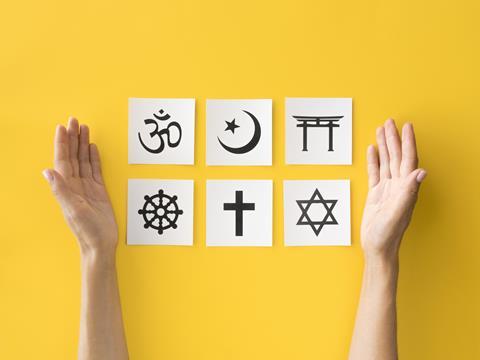Isn’t it arrogant and dangerous to claim the exclusivity of Christ? Andy du Feu helps Christian parents think through this contentious issue in today’s culture

I don’t know if you’ve ever done this thought experiment. Humour me for a moment.
Given your nationality, place of birth, childhood, parents/grandparents, etc., what’s the likelihood that you would have ended up believing what you do? Go ahead and put a percentage to it. Were you over 75% likely to believe what you do about Jesus?
Now flip the starting point: how likely is it that you would believe what you do had you been born in, let’s say, Gamjam district, India, where over 99% of the 3+ million people identify as Hindu?
There are thousands of religions out there, alongside belief in no form of god. How can you know that yours is right? How can our young people be sure that their beliefs are not simply part of a very human mechanism of control, and traditions passed down from early civilisations?
Curiously uncurious
It’s hard to miss the inclusive and non-discriminatory vibes in the air we breathe. Youthscape’s No Questions Asked research interviewed some teenagers and drew the following conclusions about the attitudes of some young people to belief:
- First, questioning is seen as disrespectful—either showing a lack of faith or being offensive to someone’s views.
- Second, a core belief underpinning acceptance and tolerance is that we are all the same, and so differences should be minimised.
- Third, beliefs are considered private and rooted in personal experience.
- Fourth, religion is seen in what people do, not in abstract statements about beliefs.
Do these resonate in your interactions with young people? If you have children, have you picked up one attitude more strongly than another—perhaps in interactions with their friends?
The idea of exclusivity—that one idea is right while others are not—is tough to take in our society
We can easily succumb to the desire to avoid conflict and roll with the attitude that “what’s right for you is right for you.” Only, I don’t think that this attitude is very helpful. Does “live and let live,” while it sounds all laissez-faire, actually harm people and hinder the good news?
Maybe we need to put effort into piquing the curiosity that is inherently human. We love a good conspiracy theory and happily dive down social media rabbit holes, so what about provoking a little reaction in your teenager?
Irreligion as a force for evil?
Religion is often dismissed as the cause of most wars. For sure, the Crusades are not exactly Christianity’s high point. The newsreader in Horrible Histories explains the Middle Ages as: “The time when the Christian people of Europe decided to go to war with the Islamic people of the Middle East just because they didn’t believe in the same things. Hard to imagine, I know.”
Ouch. That cynicism has fed schoolchildren for the past couple of decades. The reality of the Crusades, as brutal as they were, is far more nuanced than the Horrible Histories summary (I am in no way defending them here!). The Encyclopaedia of Wars charts 1,763 wars spanning 10,000 years. Yet a maximum of just 7% are attributed to religion, and they account for only 2% of all war-related deaths. The secular First World War was like packing more than 10 Crusades into 4 years—and even the Great War was dwarfed by the killing under communism and the genocides of the 20th century. The godless have proved themselves far more lethal than religion.
Read more:
Make your home the safest space for the biggest conversations with your youth and children
Is God dead?
But don’t religions essentially do the same thing?
Yes… and no.
One of the roots of the word religion is “to hold” or “bind together,” and in that sense, the answer is yes. Religions offer ways of looking at the world and making sense of it. Some, like Islam and Judaism, can be interpreted to regulate all aspects of life. Most try to answer the questions about life and death, and the problem of evil.
Sociologists would point out how religion helps order people’s lives through rituals and lifestyles—but also how leaders or organisations can exert control over others through religious authority. Just think of the horrific doomsday cults where leaders with messiah complexes led their people to mass suicide. OK, so that’s the extreme. But putting pressure on who you hang out with or how you behave is so common it doesn’t raise an eyebrow.
Does one person’s religious belief have anything to do with what someone else believes? Actually, yes. Christianity may give a sense of order to someone’s private life and steer their public one, but it will pull in a different direction to other faiths. When beliefs conflict, they matter a great deal to others.
Our challenge is to be confident in the coherence of our faith, and its relevance to our world and to pass that on to our youth and children
The first time I was at a fostering panel, we were put on the spot with this question: “Are there any ways in which your religious beliefs will work against the welfare of the child?” Wow. My wife looked at me as if to say, “That one is for you.” An arrow prayer later, I responded:
“I get the question. There are some religious groups who might not allow blood transfusions, for example. But as a Christian, I believe each child is made in the image of God, ascribing worth to a child greater than any other belief system. We will put the children first.”
Thankfully, I didn’t get any further questions on faith, and we were approved.
Religion—and what you believe—matters. It belongs in schools, politics, sports, hospitals.
To deny that is to deny reality. You can’t take your faith off like a coat and leave it by the door, and you cannot airbrush God out of the public square. Parliament would not have abolished the slave trade without a Christian MP called William Wilberforce campaigning because he believed God called him to do so. Confining religion to private spaces removes ethical and moral guardrails from culture, and I would suggest is impossible anyway.
Let’s party like it’s 1999 (BC)
Christianity— isn’t it judgmental, outdated and riddled with errors? Many Christians live with the tension of believing stories to be true, historical events, despite the evidence to the contrary and the wider culture that ridicules it.
By way of example, I asked ChatGPT what the origins of Noah’s flood were. The immediate answer was that they
“appear to be rooted in older Mesopotamian flood myths and reflect a broader ancient Near Eastern cultural tradition of great flood stories. The development of the Noah story likely draws from multiple sources and evolved over time.”
It then churned out the most relevant influences. It’s convincing, and your young person would likely start there. But some of the bold statements just don’t stand up to scrutiny. Watch here how Wes Huff challenges the argument that Noah borrowed from an ancient creation epic: https://www.youtube.com/watch?v=FIfZWvQzeII
2 Timothy 3:16–17 says that “all Scripture is God-breathed.” Inspired. Not simply human words. It’s one thing to read something that a wise human being has said. It’s another to read what is claimed to be divinely authored through 35 human writers, multiple styles, and spread over more than 1,500 years. Yet it holds together, weaving the story of God’s grace to humanity through every page.
Christianity celebrates diversity. Whereas some religions demand people submit without questioning, or learn in the original culture and language, the Bible is the most translated book in history. Christian faith can take root in every culture and adapt to local ways of doing things. In fact, the Bible closes with a party of countless men and women from every tribe and language worshipping God as one people.
Our challenge
The idea of exclusivity—that one idea is right while others are not—is tough to take in our society. It’s made a lot harder when some of the teaching goes against the culture. Something being rejected by a society doesn’t make it wrong. Our challenge is to be confident in the coherence of our faith, and its relevance to our world and to pass that on to our youth and children.
































